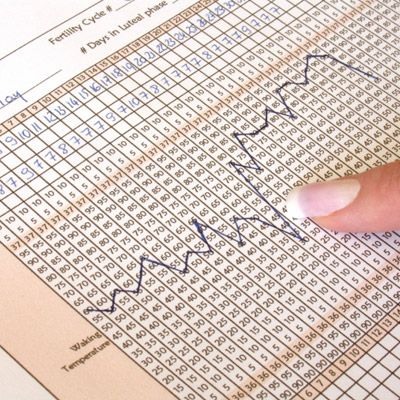
Not having regular sex
This is probably the number one baby making mistake that couples make. Most people know that having sex around ovulation is the best way to get pregnant. However, some couples get so focused on timing things just right that they only have sex during certain times of the month and may take long breaks when they think the woman is no longer fertile. Accurately pinpointing ovulation isn’t always easy so it’s better to just try to have regular sex, thus, increasing the overall odds of timing things well. Couples that have sex around three times a week are more likely to get pregnant because it may eliminate timing issues and insures that they are having sex at least once or twice during the woman’s fertile window.

Not knowing when your fertile window is
By having sex during your fertile window (the five days before ovulation and the day of ovulation) you can greatly improve your chances of getting pregnant. Not knowing when this window takes place can keep you from timing things well. The best way to identify your fertile window is to monitor your fertile signs and to use an ovulation prediction test. Ovulation tests are available at any drug store and are easy to use. Fertility charting may also help you to pinpoint your fertile window.

Not getting help with an irregular cycle
Just because your cycle is irregular doesn’t mean you aren’t ovulating. However, women with irregular cycles may have an underlying condition like PCOS which can cause fertility issues. If you have really long menstrual cycles, you may have fewer opportunities to conceive because you only ovulate once per cycle. In order to improve your chances of getting pregnant, it is important to see a doctor and get to the bottom of why your cycles are irregular and whether or not your irregular cycles could be affecting your fertility.

Using a lubricant
Not everyone knows that most lubricants are not sperm friendly and can reduce your chances of getting pregnant. Women produce a natural lubricant, or cervical fluid, that provides the perfect transportation system for sperm. When a woman approaches ovulation her cervical fluid becomes slippery and stretchy which helps to nourish sperm and helps carry it to the woman’s egg. Lubricants, on the other hand, may be hostile to sperm. Because lubricants are not designed to transport sperm, they may actually hinder sperm and slow them down, keeping them from being able to reach their destination, the woman’s egg. There are some lubricants on the market that are sperm friendly. These lubricants, such as Preseed or PreConceive Plus, are clearly labeled as fertility friendly.

Misinterpreting your fertile signs
Women sometimes assume to know exactly when they are ovulating based on knowing their fertile signs. Egg white cervical mucus is one good indicator of high fertility, for example, but women can have more than one episode of fertile mucus before they ovulate and even have egg white mucus after they ovulate. Some women also have what is known as mittleschmerz (or ovulation pain) and believe that they can tell for sure when they are ovulating based on when they feel this pain. Although this is an important fertile sign, women can experience mid-cycle pain before, during, and after ovulation. This pain doesn’t always occur precisely when a woman ovulates.

Assuming that you are fertile because your cycles are regular
Women often assume that because they have regular menstrual cycles that this automatically means they are fertile. Regular cycles are usually a good sign that a woman is ovulating but just because she is ovulating doesn’t mean her egg quality is good, that her tubes are clear, or that she is making enough progesterone to support a pregnancy. There are a number of factors that affect a woman’s fertility and having a regular cycle does not always mean a woman is fertile. You can have a regular cycle and still have fertility issues that could prevent you from getting pregnant.

Saving up sperm
There is a myth out there that a man should hold out on having intercourse until the day the woman ovulates. The thought behind this trying to conceive strategy is that if he abstains until ovulation day, he will have a higher sperm count and be more fertile on ovulation day. Couples sometimes mistakenly believe that by having sex prior to ovulation the man will use up all his good sperm and not have the best sperm available on the day the woman ovulates. The truth is having regular sex helps to improve sperm quality. In addition, sperm can live for up to five days, making conception possible even when sex occurs in the days leading up to ovulation. The more times a man ejaculates during a woman’s fertile window, the more sperm is available to fertilize the egg and the greater the chances of conception.

Having too much sex and then fizzling out
Having frequent sex during a woman’s fertile window is a great way to improve your chances of getting pregnant. Where couples sometimes go wrong is that they jump the gun on when to start having baby-making sex and go crazy with it before the woman ovulates. Ovulation isn’t always predictable and doesn’t always take place at the same time each month. It’s better to pace yourself and have a more reasonable rate of sexual activities so that you don’t run out of steam before ovulation even takes place. It also may be a good idea to have a day or so worth of “insurance sex” after ovulation just in case you miscalculated your fertile window and if you wear yourself out you may not be up for this.

Not taking care of health conditions
While being in good health is not a guarantee of fertility, having an uncontrolled or poorly managed medical condition can certainly affect your fertility. If you or your partner have a medical condition such as a thyroid disorder, diabetes, lupus, or another condition, it is especially important to work with your doctor before you start trying to get pregnant. Both partners should give up smoking and drinking alcohol before trying to conceive. Likewise, being at your ideal weight along with getting regular exercise will also improve your overall health as well as your fertility.

Assuming he’s not the problem
For whatever reason, women tend to think that the fertility world revolves around them. If they don’t get pregnant within a certain amount of time, they may automatically assume that there is something wrong with them. In actuality, fertility problems affect both men and women at about the same rate. If you are having problems getting pregnant, it is important that both you and your partner are evaluated.

Not seeing a doctor soon enough
Each month a woman only has about a 20 percent chance of getting pregnant. Thus, getting pregnant may take longer than just a month or two. Couples should be prepared to give things a little time. However, it shouldn’t take longer than a year. If you are under 35 you should see your doctor if you have been trying to get pregnant for a year unsuccessfully. If you are 35 or older, you should get in to see your doctor sooner, after six months of trying.